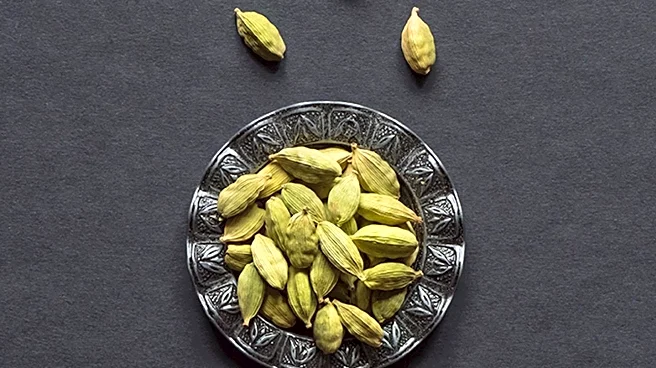What's Happening?
Megan Clendenan, a Vancouver-based author, has released a new book titled 'Just in Case: Saving Seeds in the Svalbard Global Seed Vault.' The book highlights the construction and significance of the Svalbard Global Seed Vault in Norway,
which houses over 580 million frozen seeds. Clendenan was inspired to write about the seed vault after learning about it through a podcast. Her book aims to educate young readers about the importance of seed preservation and the role of cooperation in addressing global challenges. Clendenan's work emphasizes the connection between seeds, food, and history, and encourages readers to take action in preserving biodiversity.
Why It's Important?
The Svalbard Global Seed Vault serves as a critical resource for preserving crop biodiversity, which is essential for food security and sustainability. Clendenan's book brings attention to the importance of seed preservation in the face of climate change and global conflicts. By educating young readers, the book aims to inspire future generations to engage in environmental conservation and sustainable practices. The vault represents international collaboration and the potential for positive outcomes when nations work together. This message is particularly relevant as the world faces increasing environmental and geopolitical challenges.
What's Next?
Clendenan's book may inspire educational initiatives focused on environmental conservation and biodiversity. Schools and libraries could incorporate the book into their curricula to promote awareness of seed preservation and sustainability. Additionally, the book could lead to increased interest in the Svalbard Global Seed Vault and similar projects worldwide. As young readers become more informed, they may advocate for policies that support biodiversity and environmental protection. The book's release could also spark discussions among educators and policymakers about the importance of teaching environmental topics to children.
Beyond the Headlines
The book highlights the ethical and cultural dimensions of seed preservation, emphasizing seeds as carriers of history and cultural heritage. Clendenan's work encourages readers to view seeds as more than just agricultural products, but as vital components of human history and future sustainability. This perspective may lead to a broader understanding of the interconnectedness of global food systems and the need for diverse crop varieties. The book also underscores the role of storytelling in preserving knowledge and inspiring action, suggesting that narratives can be powerful tools for change.










